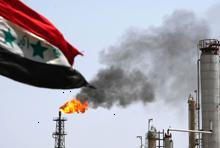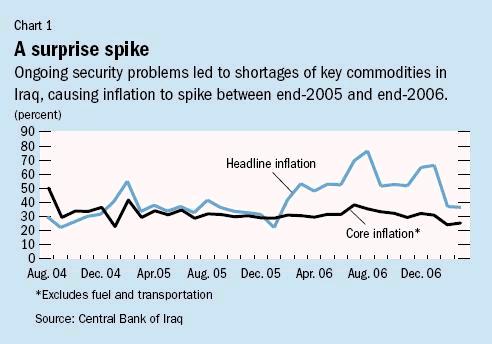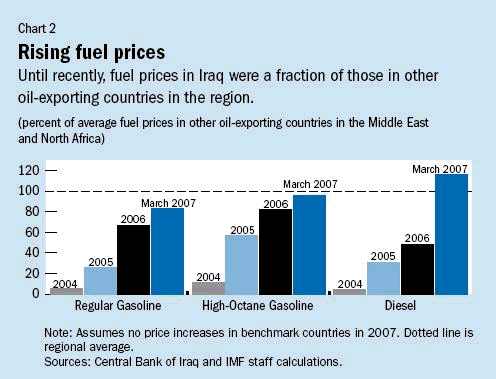
Typical street scene in Santa Ana, El Salvador. (Photo: iStock)
IMF Survey: Iraq Moves to Stabilize, Reform Economy
May 7, 2007
- Iraq entering crucial period in its economic stabilization
- Continued violence hampering recovery
- Strong policy response to sharp jump in inflation
When the IMF Executive Board approved a 15-month, precautionary Stand-By Arrangement for Iraq in December 2005, the country set out on a broad economic reform program.

Refinery at Basra, Iraq, where lack of investment prevented expansion of oil output last year from 2005 level (photo: Atef Hassan/Reuters)
RESOURCES FOR RECONSTRUCTION
Under the program, the government aimed to rebuild the oil sector, which represents two-thirds of Iraq's GDP; gradually reduce pervasive and inefficient subsidies while making more resources available to improve such public services as infrastructure, education, health care, and security; and keep the Iraqi dinar broadly stable against the U.S. dollar as an anchor for macroeconomic stability. Fifteen months later, in March 2007, the IMF reviewed Iraq's reform program. Here we assess how the economy has fared.
Oil sector
The unforeseen deterioration in the security situation, especially in the second half of 2006, resulted in a dramatic increase in human suffering and the displacement of large numbers of people. The authorities have also struggled to maintain macroeconomic stability and create the conditions for sustainable growth over the medium term.
In 2006, the authorities put in place a budget that aimed to control the growth of current spending and reduce fuel subsidies so that they could concentrate resources on reconstruction, in particular in the oil sector. Despite very difficult circumstances, they largely succeeded in achieving several of their goals.
However, because of the prevailing violence, weak implementation capacity, and difficulties with procuring oil-related investment goods in a tight world market, the investment execution rate was only about 40 percent. Although the government had an overall budget surplus of about 11 percent of GDP, this came at the expense of much-needed investment, especially in the oil sector.
The lack of investment prevented an expansion of oil output, which remained unchanged from the previous year at about 2 million barrels a day. Real GDP growth, which was initially projected at more than 10 percent, ended the year at only 3 percent.
Ambitious reform program
To spur Iraq's transition to a market economy, the authorities also embarked on an ambitious agenda of structural reforms. In the fiscal area, they introduced a modern financial management information system, and the Iraqi parliament is reviewing amendments to make the pension law sustainable. Because of the lack of security and capacity constraints, some other measures were delayed. These include a census of public service employees and the adoption of a new budget classification system, in line with IMF guidelines.
In the financial sector, the authorities, with assistance from the IMF, set up a modern payment system and initiated an overhaul of the central bank's accounting, reporting, and auditing systems. Simultaneously, they are working on restructuring the state-owned banks and on implementing a new banking supervisory system.
Oil sector reforms included enacting legislation to liberalize the imports of fuel products; approval by the Council of Ministers of a much-needed draft hydrocarbon law; and, starting this year, elimination of all direct budgetary fuel subsidies, except on kerosene.
Unwelcome development
However, a surprise jump in inflation from 32 percent at end-2005 to 65 percent a year later raised serious concerns (see Chart 1). The increase was caused mainly by shortages of key commodities, especially fuel products, which were largely the result of the continuing lack of security in Iraq. In a recent poll, 62 percent of Iraqi respondents complained about the availability of basic household goods, up from 38 percent in 2005.
But underlying inflation (excluding fuel and transportation costs) was also stubbornly high, at about 30 percent. Given that the Central Bank of Iraq (CBI) maintained a tight grip on Iraqi dinars in circulation while the budget was in surplus, the high inflation appears to have been accommodated by the pervasive cash dollarization of the economy.
In mid-November 2006, the authorities initiated a strong policy response to the inflationary pressures. One of the objectives of the government budget for 2007 was to prevent current spending from putting further inflationary pressure on the small non-oil economy. The CBI, meanwhile, raised its policy interest rates sharply and allowed the dinar to appreciate against the dollar, which was possible in view of Iraq's comfortable level of international reserves (almost six months of import cover).
These measures were intended to dedollarize the economy to enhance the CBI's control over monetary conditions and also to reduce imported inflation. This policy appears to have had some success in increasing the demand for local currency. Moreover, in February 2007, overall inflation came down to 37 percent, and core inflation fell to 24 percent. Similar rates of inflation were recorded for March. But it is too soon to declare victory over inflation.

Fuel price adjustments
Despite strong initial political resistance, the authorities began in December 2005 to increase fuel prices gradually. Before the adjustments, fuel prices were extremely low, even by regional standards, with regular gasoline selling in Baghdad for 3 cents a liter and, outside the capital, for less than half that price. But fuel shortages worsened and inflation increased during 2006, making it an urgent priority to ease supply bottlenecks in the fuel market.
The authorities took action on two fronts: first, raising the price of fuel products to reduce the incentive for smuggling; and second, allowing the private sector to import fuel products. By March 2007, the prices of regular and premium gasoline were near the average levels in other oil-exporting countries in the Middle East and North Africa, and prices for diesel exceeded the regional average (see Chart 2).

One important outcome of the price increases was a reduction in budgetary subsidies, which allowed budgetary resources to be shifted to priority public services. Despite the increases, official fuel prices are still lower than the black market prices that most people have to pay. By and large, Iraqis seem to have largely accepted the higher prices because they consider it more important to have a regular supply of fuel.
With the passage of new legislation last October to allow private fuel imports, the increase in fuel prices is expected to make it more attractive for the private sector to become active in this area. It is hoped that better fuel availability in 2007 would help reduce black market prices and ease inflationary pressures.
The way forward
Iraq is entering a crucial period in its economic stabilization and recovery. Over the past 15 months, encouraging progress was made in strengthening economic policies and implementing structural reforms. However, much remains to be done. In the period ahead, the economic policy framework supported by the Stand-By Arrangement will also contribute to the International Compact with Iraq. It is hoped that this new partnership with the international community will help improve the political and security situation, which is essential to securing Iraq's future economic development.







